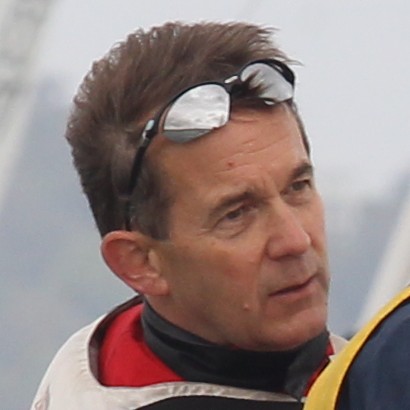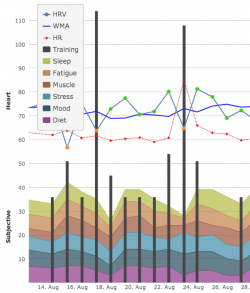I have been racing sailing dinghies, sportsboats and offshore yachts for over forty years, competing in world championships in several different classes. I still campaign a J105, and occasionally race a National Twelve and an SB20 sports boat, long after most of my contemporaries have had the sense to hang up their foul weather gear. I also run 10 to 20 miles a week just for fun and cycle around 80 miles a week because is the best way to get around.
I generally forget to take a chest strap and dongle with me when heading to sea for an offshore race, so have not had the opportunity to look at the impact of serious sleep deprivation and sustained non-aerobic effort on my HRV. But I remembered to pack the kit when heading out for a two handed race from Southampton to St Peterport over the bank holiday.
It was a pretty straightforward overnight race, starting at 7:15pm after a very busy working day and a tense drive to the boat from London fighting with rush hour traffic, so we only just made the start in time. Conditions were great, with a 15 – 18 knot wind from just north of west, making for a quick channel crossing and a race time of 11 hours 59 minutes. As a result we were moored up in St Peterport by about 8am, not long after the time that I take my HRV every morning.
So what happened to my HRV? Typically my HRV is in a range between 74 and 78 with a resting heart rate of around 59 -60. The previous morning my HRV had been 80 and resting heart rate 61. Just over 24 hours later, with no sleep and a night of sustained concentration and non-aerobic physical effort, my HRV was 65 (the level I experience the morning after a half marathon) and I couldn’t get my resting heart rate below 84.
And what happened next to my HRV? We had a very good full English breakfast and before heading to bed for a few hours, we took a trip round the house where Victor Hugo lived in exile and wrote Les Miserables. After a late lunch, we then headed off for gentle 10km run before attending the prize giving for the previous night’s race (only at this point discovering that we had won – this sort of event is subject to a complex handicapping system based on the size and type of boat you are sailing), having dinner with our fellow competitors, and finally, as you might expect, getting a very good night’s sleep. We were up early for the crossing back to England, but we didn’t head off before I had taken my HRV, up at 82 (just the sort of bounce that I get on the second day after a half marathon distance), with heart rate 65 (possible slightly raised by being in a rush to get away to on time).


